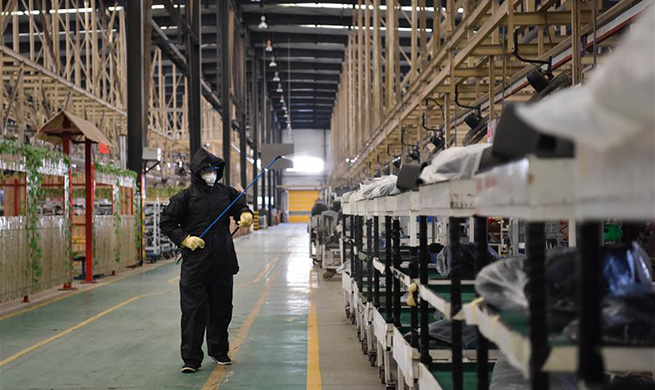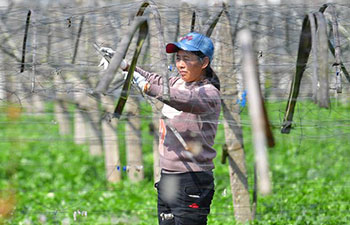BANJUL, Feb. 16 (Xinhua) -- The descendants and the home village of the enslaved Kunta Kinte from Gambia have been economically benefiting from his historical legacy through booming tourism in Jufureh, the north bank of the country.
He was captured by the slave traders and sold to the new world as a slave where he was forced to work on his so-called master's plantation until his death in 1822.
After several centuries, tourists have been coming in numbers to see some historical sites including James Island (Kunta Kinteh Island) , where he was detained before he was shipped to America, Albreda where a slave museum is located as well as his family home in Jufureh.
"Jufureh and Albreda are very important communities in this country because these were the major settlements of Europeans in the Gambia during the period of slavery, right down to the abolition of slavery," a tour guide in Jufureh, Lamin Trawally told Xinhua.
"Today they serve as one of the most visited excursion centers for tourists who are coming to visit the Kunta Kinteh island and other historical sites in the village here," he continued.
He said most of the tourists who are coming to the country are contributing significantly to the growth of both Jufureh and Albreda economically.
"Each tourist is paying 200 dalasis (about 4 U.S. dollars) which goes to the welfare of the village development. It also provides employment because people like myself and my colleagues are working because of the tourist visitations," Lamin told Xinhua.
A ticket seller for National Centre for Arts and Culture (NCAC) who is stationed at Albreda, Binta B. Jallow, said the income generations have been significant to the national coffers.
Local organisations such as Jufureh & Abreda Youth Association (GAYA) are also a beneficiary of Kunta Kinteh's legacy through its daily collections from the tourists, which has enabled the association to create development in the two communities.
The association's senior revenue collector, Bakary Fofana disclosed their annual turnover, amounting to 300 000 dalasis.
"This is helping our two communities a lot. We are now offering worthwhile pay to our tour guides; we are renovating some areas in the communities and we have also taken charge of the payment of the village taps every month," he told Xinhua.
Meanwhile, the eldest descendant of the eighth generation of Kunta Kinte, Mariama Fofana said they have the right to be sad about Kunta's story but admits that his legacy is overwhelming.
"We were very sad about this and that's normal because Kunta Kinte descended from us, even though I did not witness it, neither my mother nor my father did. But when we were told about it, we must feel sad just like any other human being would have," she said.
For her, "the good thing is that white people are visiting his origin as tourists. History has also cemented and diversified our relationships with many people in different parts of the world and this is why many white people are visiting this community".
"This happens thanks to Kunta Kinteh's history. We are now satisfied with this new experience. In the end, it's all peaceful here and we will continue to pray for Kunta to rest in peace," she concluded.
The Gambia government has announced that it will stage the "Roots Homecoming Festival" in Jufureh in December to celebrate Kunta Kinte's legacy through the promotion of cultural displays.












